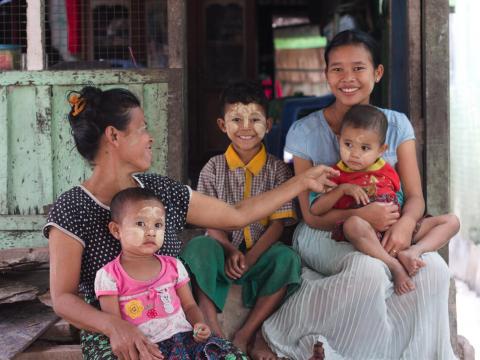
The things we can’t forget when it comes to ending poverty
By Colin Dyer
Poverty is never just about the amount of money you have. Relationships, attitudes, access, and mindsets are just three factors, among others, that can contribute to someone living in poverty.
I’ve been thinking about this a lot lately, since attending Economic Inclusion for the Poorest – Moving to Scale learning event hosted by the Partnership for Economic Inclusion (PEI) with a few other World Vision colleagues. After a conference like this, I seem to flip between two emotions. The first is inadequacy. All the great stories and information about what others are doing highlights what I perceive as my shortcomings and amplifies what often feels like our lack of impact. But the other emotion is energised. The sessions can give me ideas that help me to press forward and have a ‘dream’ perspective that will enthuse me to overcome all the obstacles I can see, and those I can’t.
It is while moving between these two emotions, that my colleagues and I identified five points we all need to remember when doing this work:
- Poverty often doesn’t affect one person in isolation
Most often, the whole of the household, often the whole community, is poor, and all are vulnerable. We probably know this, but it needs to be at the front of our minds if there is going to be a serious attempt to address multi-dimensional poverty – we need multi-dimensional responses that address the whole of the household, not just individual members. We see this in action when we look at the difference between the impact from programmes that are household focused, and those that don’t. - Women bear the brunt of poverty, and can often hold the key to overcoming it
While on a global scale, the numbers tell us women account for about 50% of people living in poverty, we know that behind those numbers is a reality in which women bear the greatest impact of extreme poverty. And on the positive side, interventions that give women the skills, knowledge, mindsets and access often result in the greatest outcomes for all members of a household, especially children. - We need to scale interventions that work
We are all wrestling with questions about how we reach the poorest of the poor and ensure that they are able to have the same access to opportunity as others, at scale World Vision works with governments in the implementation of Ultra-Poor Graduation in at least two countries; Rwanda and Mongolia. Interestingly, in the recent event I heard this programming, where the needs of the most vulnerable are being addressed in a partnership between government agencies and implementing non-governmental organisations, called an Economic Inclusion program. I was particularly pleased to hear that these collaborative approaches – which we have been championing for so many years – were being seen and affirmed by industry leaders. - Our decisions must be informed by credible data
This world, with all its sceptics and nay-sayers will always find fault or the reason not to support a pressing need. For example, questions may arise about our costs, the scale of the need or our methods. All of us, but particularly large, multi-mandate organisations like World Vision, must be able to address the questions that arise with honesty and transparency and demonstrate the return on donors’ investment into these types of interventions. Many are looking for the results of Randomised Control Trials to support positions and arguments for Economic Inclusion programmes. We were challenged to incorporate an increased rigor and in research and data collection that is credible and compelling. - Our focus must remain on people
We, personally and collectively, need to remain human-centred and child focused. So often in virtual events where we discuss these big, high-impact concepts and practices, the voices of those directly affected are missing. In high-level meetings with government officials, institutional and corporate donor executives and agency leaders, we are so often missing those whose lives we were discussing. Continually, we need to ask ourselves: “Who is being affected and have they been fully consulted? Are all the stakeholders included in this discussion equally? How can we connect these agendas and make these events and our work more inclusive and representative of all stakeholders, not just the power brokers and holders of the money?”
I believe we need to move beyond reflecting and knowledge sharing to coming up with solid actions that will make a measurable difference. Most importantly, I hope we can also accelerate positive action and be more collaboratively with the people we are serving so we journey with them as partners.
Colin Dyer is the Senior Advisor for Quality and Innovation in World Vision’s Global Livelihoods team.